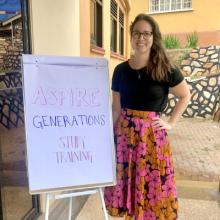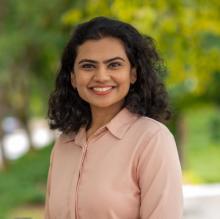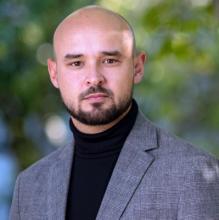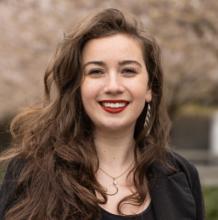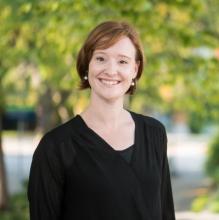As scholars, it is not enough to simply conduct research and publish results. We also must implement findings and advocate for progressive, sustainable change. Doctoral students should be encouraged to break outside of the boundaries of academia and explore how their degrees can be applied within a diversity of environments. This will not only create more robust PhD candidates but will also lead to a stronger global research community.
Research Description
My doctoral research focuses on the social and economic impacts of a woman’s cervical cancer diagnosis on herself and her children in Uganda. Despite being a preventable disease, cervical cancer is the leading cause of cancer mortality among women in low- and middle-income countries (LMIC). In Uganda, 80% of women are diagnosed with an advanced stage of this disease. To date, the majority of research in LMICs has focused on the clinical impacts of cervical cancer, whereas very little is known about the indirect social and economic impacts. This includes not only the women diagnosed, but their children as well. For my project, I collaborated with the Uganda Cancer Institute to design and implement a multi-method study that surveyed over 350 women being treated for cervical cancer in Uganda. We asked women about the effect of their diagnosis on their children’s education, family’s financial stability, and the amount of time they were required to spend away from their families. The results of this study will be used to demonstrate the far-reaching impacts that a woman’s cervical cancer diagnosis has and advocate for the expansion of global cervical cancer screening programs.
What does being a Public Scholar mean to you?
As a long-term scholar of global health, I have spent the majority of my career advocating for increased global health equity, particularly among women. To date, the majority of this work has been focused on academic institutions. However, the COVID-19 pandemic has amplified discussions of global inequalities in everyday conversations. I entered the School of Population and Public Health with the primary intention of developing research skills and connections that would allow me to successfully pursue an academic-focused career. However, the COVID-19 pandemic made it clear that my skills and expertise can be used to make meaningful impacts beyond traditional academic spaces. As a Public Scholar, I plan to expand my horizons by forming non-traditional connections and developing effective knowledge translation skills that will lead to meaningful, sustainable change in global inequality.
In what ways do you think the PhD experience can be re-imagined with the Public Scholars Initiative?
As scholars, it is not enough to simply conduct research and publish results. We also must implement findings and advocate for progressive, sustainable change. In the past, doctoral students have entered the PhD. program with the primary intention of obtaining a faculty appointment. However, with the shrinking pool of available positions and the growing need for experienced changemakers in areas such as knowledge translation, public policy, and development, we must shift our end goals. Doctoral students should be encouraged to break outside of the boundaries of academia and explore how their degrees can be applied within a diversity of environments. This will not only create more robust PhD candidates but will also lead to a stronger global research community.
How do you envision connecting your PhD work with broader career possibilities?
I want to create meaningful policy change through my work as a women’s health researcher. More specifically, I hope to expand access to women’s health on both a local and global level. The work that I have completed for my doctoral research has facilitated connections with global leaders, policymakers, and stakeholders with the field. These connections will not only further my career and networking opportunities, but also allow me to market myself as a multisectoral candidate.
How does your research engage with the larger community and social partners?
The underlying goal of my research is to expand global cervical cancer screening programs to eliminate cervical cancer worldwide. One of the essential foundations of my research is my partnership with the Uganda Cancer Institute. In global health research, strong partnerships with local institutions are essential to ensure integrity and genuineness. Over the past three years, I worked collaboratively with Uganda Cancer Institute staff and researchers to develop and execute our research project. Historically, projects in low- and middle-income countries have largely been led by investigators in high-income countries, such as Canada, with little to no input from local communities or investigators. This often prevented these countries from prioritizing their needs and furthering their research capacity and agendas. Unsurprisingly, this has resulted in distrust and scepticism among many communities to participate in research. As a Public Scholar, I intend to work to better understand my role as a Canadian researcher working outside my country and focus on prioritizing the needs and self-governance of research by local communities.
Why did you decide to pursue a graduate degree?
Simply put, I wanted to do more. I have known since I was 14 that I wanted to pursue a career in public health. I was lucky enough to be exposed to public health early in high school and given opportunities to engage in the field. Even when I applied for my undergraduate degree, I knew that I would eventually complete a Master of Public Health. However, I never in my wildest dreams thought that I would ever complete a PhD. After working at several universities after my MPH, I fell completely in love with research and the problem-solving it entails. I was also lucky after I joined UBC to have an incredible mentor who encouraged my passion for research and taught me a multitude of skills. My choice to apply for a doctoral degree was fueled by my desire to do more and operate in an independent capacity.
Why did you choose to come to British Columbia and study at UBC?
I moved to Vancouver in 2018 and was fortunate enough to obtain an employment position at UBC. As a newcomer to Canada, I was immediately embraced by the people and culture of the University. Moreover, not only is UBC a leading research university in Canada, but it is also globally recognized. There was no question that I would pursue my PhD at UBC when I chose to apply. I am incredibly thankful to have been welcomed into a research team that has allowed me to gain valuable skills that can be applied both in and outside of academic settings.
As scholars, it is not enough to simply conduct research and publish results. We also have a duty to implement findings and advocate for progressive, sustainable change.

